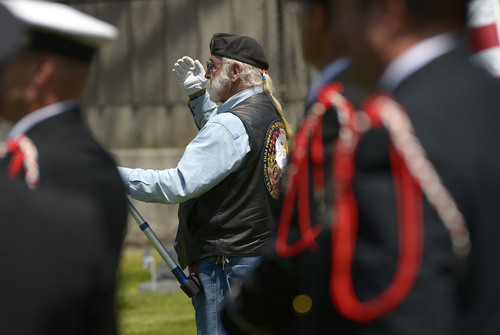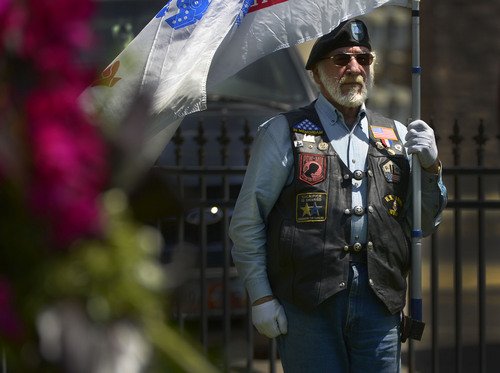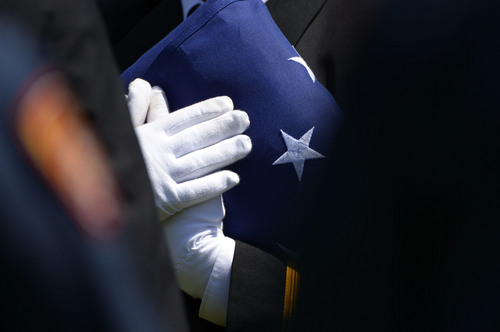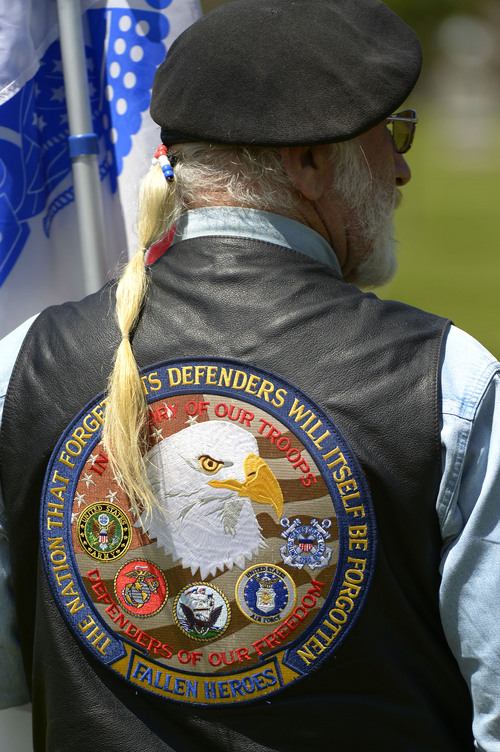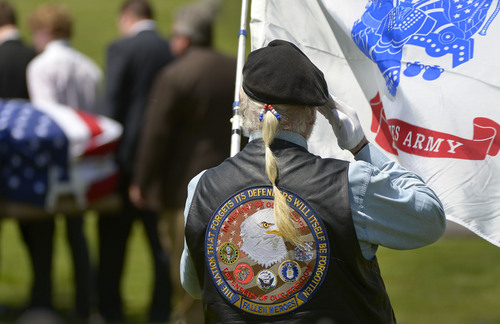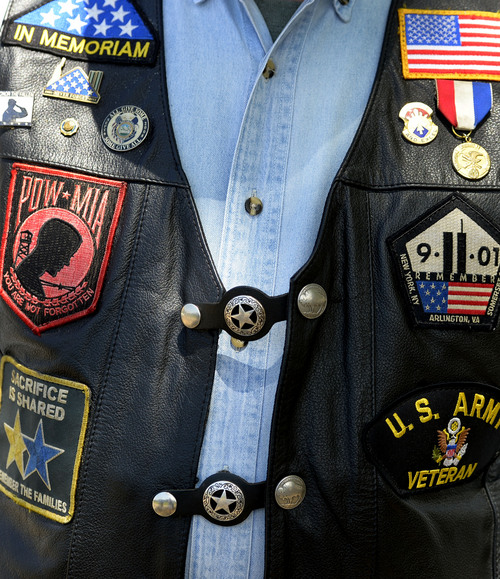This is an archived article that was published on sltrib.com in 2014, and information in the article may be outdated. It is provided only for personal research purposes and may not be reprinted.
Draper • As the pallbearers carried the casket to the grave, Bruce Clements stood at attention, saluting.
Clements didn't know the deceased, Thomas John Sadler, but that didn't matter. Sadler's obituary said he served in the U.S. Army in the Korean War. That was all Clements needed to know.
On Thursday, as he has done hundreds of times, Clements put on his black leather vest with an American flag and other military patches over a blue denim shirt. Clements, who is 70, also placed a black beret over the gray hair he has bundled into a pony tail. He threw a leg over his Kawasaki motorcycle and rode to Sadler's funeral to ensure someone recognized Sadler's time in the military.
When he arrived at Draper's city cemetery, Clements removed the U.S. Army flag — white with a blue and red Army insignia — from his right saddlebag. He has a flag for each branch of the military. He extended the pole and placed the bottom end in a stirrup fastened to his belt at his left hip. Clements was in position, about 20 yards from the grave, between it and the hearse, as the bagpipes played and the pallbearers started their march.
It was Clement's 70th funeral this year. But he's behind his usual pace.
Last year, Clements attended 231 funerals for military veterans. He learns about the funerals by browsing the obituaries on The Salt Lake Tribune website. When he sees a funeral for a veteran on the Wasatch Front, he goes — unless his increasing age or something else prevents him. He's been known to attend three funerals a day.
Clements admits that he does so out of a little bit of guilt. Clements served in the Army reserves for 11 years with a personnel services company. The Army never deployed Clements and he never saw combat.
"With that many years of service," Clements said, "and not being deployed, and not seeing combat, I feel like I have an obligation and duty to honor those who did."
Clements was a Salt Lake County sheriff's deputy for 32 years and also attends funerals for peace officers and firefighters. He retired from the Sheriff's Office in 2004. The next year, Clements decided to spend his free time attending funerals for veterans.
He joined the Patriot Guard Riders, a group of motorcycle riders who travel to veterans' funerals. But after 1 ½ years, Clements left the group.
Clements did not want to go into details during a Thursday interview, but said conflicts within the Patriot Guard Riders turned him away from the group.
"It became a conflict of personalities, let's put it that way," Clements said. "The old saying about there being too many chiefs and not enough Indians ... "
So Clements started attending funerals for veterans on his own. Color guards and 21-gun salutes are typically reserved for soldiers killed in action or high-ranking officers. Military honors for the average veteran consist of someone from the National Guard or a veterans organization sounding "Taps," and a couple more to fold the flag draped over the coffin.
Sometimes, Clements said, veterans don't even have that, and he's the only person or thing there to acknowledge that the deceased served in the military. At a funeral on Wednesday at the Salt Lake City Cemetery, Clements said, a few of the veteran's family tried to fold the flag themselves. Somewhere in the process, the family made errors, and Clements noticed.
"It's disrespectful for the flag," Clements said. "In turn, having the flag folded improperly at a funeral shows disrespect for the veteran."
Clements said family members sometimes ask whether he knew the deceased. He says no and explains why he's there. Clements said he has never been asked to leave.
Clements has gotten to know some of the Utah National Guard personnel who serve at funerals. A few years ago, he said, the National Guard's honors staff was shorthanded at a funeral. They asked Clements if he could handle the bugle. When the time came, Clements stood at attention, held up the bugle and pressed play on the audio player inside what looks like a real bugle.
The episode started an ongoing relationship in which Clements helps the National Guard's honors personnel when they need it.
Paul Raymond, who works for the private contractor that coordinates funeral honors for the Utah National Guard, said the honors team doesn't know which funerals Clements will be attending, but they know they can give Clements an assignment when they find him there.
"I don't know that there's a single person in the state who does what he does," Raymond said.
Clements lives in Holladay, but in 2011 he joined American Legion Post 19 in Lehi because it has a motorcycle chapter. He keeps track of the funerals he attends and submits them to Post 19, so it can submit them to state headquarters. Posts need to demonstrate the service they provide to the community.
Clements said the most poignant funerals have been for soldiers killed in Iraq and Afghanistan.
"Not enough can be said or done to show the nation's gratitude to the men and women who have fallen by the wayside in a combat zone," Clements said.
He's less philosophical about his own funeral plans. Clements said he has left his executor instructions to cremate him and place him in a plot next to his parents at Lake Hills Memorial Mortuary and Cemetery in Sandy. He has twin sisters, two children and five granddaughters and does not want them to provide him a funeral.
He said those wishes have to do with his days as a deputy sheriff. Clements said he too often had to insert himself into the lives of people who didn't want him there.
"I've kind of had the attitude, 'You know what, people have had enough of me,' " he said.
At Sadler's funeral Thursday in Draper, Clements dropped the salute after the casket passed, but he remained standing with the flag. Sadler retired as a deputy chief with the Unified Fire Authority, and UFA personnel supplied a color guard and a bagpiper. But an American flag over the casket, and Clements, were the only signs Sadler had served in the Army.
As the service was coming to an end and the bagpiper began playing "Amazing Grace," Clements marched with the Army flag to the end of the cemetery. He turned left-face and marched toward his motorcycle. Clements retracted the pole, rolled up the flag and put it back in the saddlebags.
He had put on his helmet when one of Sadler's cousins, Elray Dow, walked over. Dow reached over the chain link fence separating a parking lot from the cemetery and shook Clements' hand.
"Thank you, sir," Dow said.
"You're welcome," Clements replied. "It's an honor for me to be here."
Twitter: @natecarlisle


